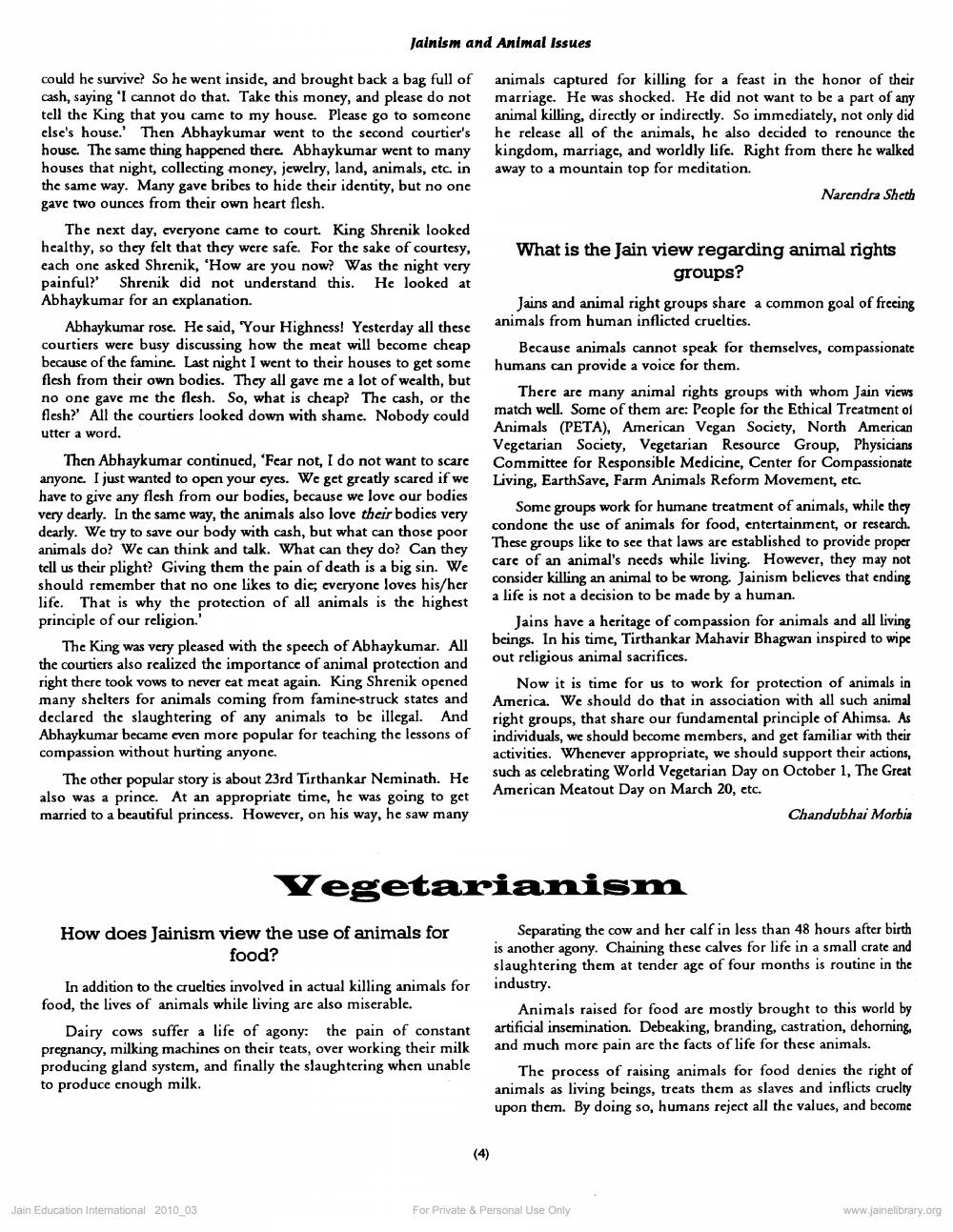________________
Jainism and Animal Issues
could he survive? So he went inside, and brought back a bag full of cash, saying 'I cannot do that. Take this money, and please do not tell the King that you came to my house. Please go to someone else's house.' Then Abhaykumar went to the second courtier's house. The same thing happened there. Abhaykumar went to many houses that night, collecting money, jewelry, land, animals, etc. in the same way. Many gave bribes to hide their identity, but no one gave two ounces from their own heart flesh.
The next day, everyone came to court. King Shrenik looked healthy, so they felt that they were safe. For the sake of courtesy, each one asked Shrenik, 'How are you now? Was the night very painful?' Shrenik did not understand this. He looked at Abhaykumar for an explanation.
Abhaykumar rose. He said, 'Your Highness! Yesterday all these courtiers were busy discussing how the meat will become cheap because of the famine. Last night I went to their houses to get some flesh from their own bodies. They all gave me a lot of wealth, but no one gave me the flesh. So, what is cheap? The cash, or the flesh?' All the courtiers looked down with shame. Nobody could utter a word.
Then Abhaykumar continued, 'Fear not, I do not want to scare anyone. I just wanted to open your eyes. We get greatly scared if we have to give any flesh from our bodies, because we love our bodies very dearly. In the same way, the animals also love their bodies very dearly. We try to save our body with cash, but what can those poor animals do? We can think and talk. What can they do? Can they tell us their plight? Giving them the pain of death is a big sin. We should remember that no one likes to die; everyone loves his/her
life. That is why the protection of all animals is the highest principle of our religion.'
The King was very pleased with the speech of Abhaykumar. All the courtiers also realized the importance of animal protection and right there took vows to never eat meat again. King Shrenik opened many shelters for animals coming from famine-struck states and declared the slaughtering of any animals to be illegal. And Abhaykumar became even more popular for teaching the lessons of compassion without hurting anyone.
The other popular story is about 23rd Tirthankar Neminath. He also was a prince. At an appropriate time, he was going to get married to a beautiful princess. However, on his way, he saw many
How does Jainism view the use of animals for food?
Jain Education International 2010_03
Dairy cows suffer a life of agony: the pain of constant pregnancy, milking machines on their teats, over working their milk producing gland system, and finally the slaughtering when unable to produce enough milk.
animals captured for killing for a feast in the honor of their marriage. He was shocked. He did not want to be a part of any animal killing, directly or indirectly. So immediately, not only did he release all of the animals, he also decided to renounce the kingdom, marriage, and worldly life. Right from there he walked away to a mountain top for meditation.
(4)
What is the Jain view regarding animal rights groups?
Jains and animal right groups share a common goal of freeing animals from human inflicted cruelties.
Because animals cannot speak for themselves, compassionate humans can provide a voice for them.
Narendra Sheth
There are many animal rights groups with whom Jain views match well. Some of them are: People for the Ethical Treatment of Animals (PETA), American Vegan Society, North American Vegetarian Society, Vegetarian Resource Group, Physicians Committee for Responsible Medicine, Center for Compassionate Living, EarthSave, Farm Animals Reform Movement, etc.
Vegetarianism
Some groups work for humane treatment of animals, while they condone the use of animals for food, entertainment, or research. These groups like to see that laws are established to provide proper care of an animal's needs while living. However, they may not consider killing an animal to be wrong. Jainism believes that ending a life is not a decision to be made by a human.
Jains have a heritage of compassion for animals and all living beings. In his time, Tirthankar Mahavir Bhagwan inspired to wipe out religious animal sacrifices.
In addition to the cruelties involved in actual killing animals for industry. food, the lives of animals while living are also miserable.
Now it is time for us to work for protection of animals in America. We should do that in association with all such animal right groups, that share our fundamental principle of Ahimsa. As individuals, we should become members, and get familiar with their activities. Whenever appropriate, we should support their actions, such as celebrating World Vegetarian Day on October 1, The Great American Meatout Day on March 20, etc.
Separating the cow and her calf in less than 48 hours after birth is another agony. Chaining these calves for life in a small crate and slaughtering them at tender age of four months is routine in the
Chandubhai Morbia
Animals raised for food are mostly brought to this world by artificial insemination. Debeaking, branding, castration, dehorning, and much more pain are the facts of life for these animals.
For Private & Personal Use Only
The process of raising animals for food denies the right of animals as living beings, treats them as slaves and inflicts cruelty upon them. By doing so, humans reject all the values, and become
www.jainelibrary.org




